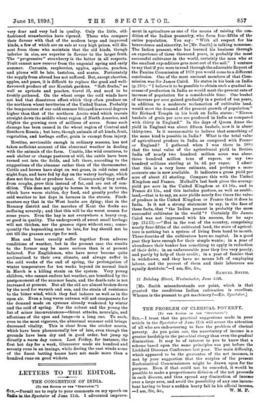LETTERS TO THE EDITOR.
THE CONGESTION OF INDIA.
[TO THE EDITOS OF THE " firxcr•Tos.") SIR,—Permit me to reply to your comments on my speech on Rai& in the Spectator of June 11th. I advocated improve. went in agriculture as one of the means of raising the con- dition of the Indian peasantry, who form four-fifths of the entire population. You say : " With all respect for his benevolence and sincerity, he [Mr. Smith] is talking nonsense. The Indian peasant, who has learned his business through an experience of three thousand years, is probably the most successful cultivator in the world, certainly the man who at the smallest expenditure gets most out of the soil." I venture to say that if you were to read through the admirable Report of the Famine Commission of 1878 you would come to a different conclusion. One of the most eminent members of that Com- mission was Sir James Caird. He states in his book on India (p. 210): " I believe it to be possible to obtain such a gradual in- crease of production in India as would meet the present rate of increase of population for a considerable time. One bushel of increase per acre gained gradually in a period of ten years, in addition to a moderate reclamation of cultivable land. would meet the demand of the present growth of population." Sir Richard Temple in his book on India states : "Eleven bushels of grain per acre are produced in India as compared with thirty in England." In the days of Queen Anue the yield in England was about fifteen bushels, now it is about thirty-two. Is it unreasonable to believe that something of the same kind is possible in India ? What is the total value of agricultural produce in India as compared with France or England ? I gathered when I was there in 183t; that the total value of the agricultural yield in British India off nearly two hundred million acres was about, three hundred million tens of rupees, or say two hundred millions sterling at ls. 4d. per rupee. I admit that this is a very loose estimate, and perhaps a more accurate one is now available. It indicates a gross yield per acre of about £1 sterling. Compare this with the United Kingdom and France. Mulhall's last book gives the average yield per acre in the United Kingdom at £4 16s., and in France £4 12s., and this includes pasture, as well as arable. land,—that is to say, an acre yields nearly five times the value of produce in the United Kingdom or France that it does in India. Is it not a strong statement to say, in the face of these facts, that " the Indian peasant is probably the most successful cultivator in the world "? Certainly Sir James Caird was not impressed with his success, for he says (pp. 212-13) :—"But in the rest of the country, comprising nearly four-fifths of the cultivated land, the state of agricul- ture is nothing but a system of living from hand to mouth. Three-fourths of the cultivators have no capital. In a good year they have enough for their simple wants ; in a year of abundance their banker has something to apply in reduction of their debt ; in an unfavourable year they live very poorly, and partly by help of their credit ; in a year of famine that is withdrawn, and they have no means left of employing labour, and the poorest of them and their labourers are equally destitute."—I am, Sir, &c.,
SAMUEL SMITH.
11 Delahay Street, Westminster, June 13th.
[Mr. Smith misunderstands our point, which is that granted the conditions Indian cultivation is excellent. Whence is the peasant to get machinery P—ED. Spectator.]


































 Previous page
Previous page